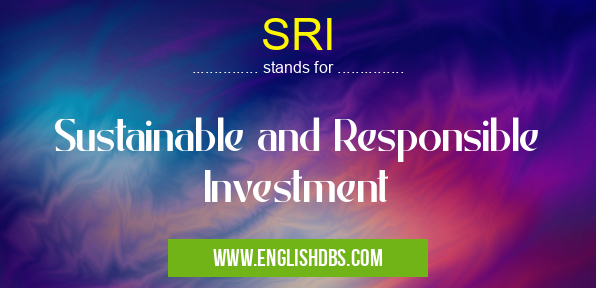What does SRI mean in INVESTMENTS
Sustainable and Responsible Investment (SRI) is an investment strategy that takes into account environmental, social and corporate governance (ESG) criteria to generate long-term returns while simultaneously having a positive impact on society. SRI provides investors with the opportunity to integrate their personal values into their investment decisions, contributing to a more sustainable world. In addition, ESG-focused investments are becoming increasingly attractive as they typically outperform the market due to their focus on long-term value creation rather than short-term speculation.

SRI meaning in Investments in Business
SRI mostly used in an acronym Investments in Category Business that means Sustainable and Responsible Investment
Shorthand: SRI,
Full Form: Sustainable and Responsible Investment
For more information of "Sustainable and Responsible Investment", see the section below.
» Business » Investments
Definition of SRI
Sustainable and Responsible Investment (SRI) is an investment strategy where integration of environmental, social and corporate governance (ESG) criteria are taken into account alongside traditional financial analysis when making investment decisions. SRI considers the impacts of economic activities beyond those captured by traditional financial risk/return analysis, such as environmental protection or human rights concerns. It also encourages companies to be transparent about their ESG performance and how they manage these risks. The aim of responsible investing is not only to maximize investor returns but also to create positive change in society by proactively supporting companies that promote environmentally sound practices and ethical behavior.
Benefits of SRI
Sustainability has become an increasingly important factor for many investors. By investing in companies that practice sound ESG policies, investors can benefit from higher returns over the long term as well as increased stability during uncertain economic times. Companies with strong sustainability records tend to have stronger credit ratings and better access to capital markets due to greater investor confidence in their management teams' abilities. In addition, investors who adopt an SRI approach may experience greater engagement on ESG topics since they will be held accountable for their actions and investments in this space. Furthermore, responsible investing provides investors with the opportunity to make a positive impact on society by supporting businesses that promote sustainable development goals such as reducing climate change or improving labor standards around the world.
Essential Questions and Answers on Sustainable and Responsible Investment in "BUSINESS»INVESTMENTS"
What is Sustainable and Responsible Investment?
Sustainable and Responsible Investment (SRI) is an investment strategy that focuses on integrating environmental, social, and governance (ESG) factors into the decision-making process. SRI investments aim to create long-term value for both investors and society by taking into consideration impacts on the environment, society, and governance when evaluating potential investments.
What are ESG Factors?
ESG stands for Environmental, Social, and Governance Factors. These are considerations used to evaluate a company’s performance in terms of its impact on the environment, its treatment of people within its operations, as well as its business practices.
How does SRI help to promote long-term success?
By considering ESG factors in their decisions, investors are able to identify companies that are more likely to produce sustainable returns over time. Companies with strong ESG credentials often have better access to capital due to increased investor confidence. Long-term success is likely if companies have access to capital necessary for growth strategies.
How can I incorporate sustainability into my investment portfolio?
Incorporating sustainable investing into your portfolio doesn’t have to be complicated or expensive. There are a variety of ways you can begin investing responsibly including investing through mutual funds or ETFs that focus on specific ESG criteria or selecting individual stocks whose operations align with your values.
What is the difference between Socially Responsible Investing (SRI) and Impact Investing?
The primary difference between SRI and impact investing is that while SRI seeks financial returns alongside social benefits without being solely focused on achieving a specific social result; impact investing focuses explicitly on achieving positive social change first while still seeking positive financial returns.
Are there any risks associated with responsible investing?
Any type of investment comes with risks associated with it - whether it is traditional investments or SRI investments. For example, because many SRI funds focus their investments in areas where there may be riskier opportunities; they may experience greater price volatility than traditional funds focusing solely on financial performance indicators sometimes called “alpha” investments.
Is socially responsible investing more expensive than other types of investments?
As with all types of investments - fees vary based on the security or fund type selected.In general,however,it is not necessarily more expensive than other types of investments since many brokers offer commission free trading for ETFs which may include some socially responsible funds.
Final Words:
In conclusion, Sustainable and Responsible Investment (SRI) is an increasingly popular investment strategy for today’s socially conscious investor seeking both financial returns and societal impact through portfolio construction. SRI takes into account environmental, social and corporate governance criteria when making investment decisions providing investors with increased potential returns over the long term while also promoting use of resources responsibly through support of sustainable initiatives advocated by the company's management team. Ultimately, SRI helps drive positive change in society while still generating satisfactory returns for its investors.
SRI also stands for: |
|
| All stands for SRI |
